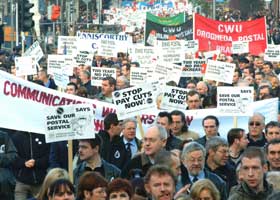9 December 2004 Edition
The right to strike
BY ROBBIE SMYTH

7,000 postal workers marched in Dublin
With two significant disputes this week in An Post and Irish Ferries, where nearly a thousand workers have been laid off by management and where government is failing to accept its responsibilities, how should we write about strikes and industrial relations conflicts in the Irish economy?
Thousands of An Post workers filled the streets of Dublin on Wednesday in a lunchtime march to Leinster House, which was addressed by a number of speakers including Sinn Féin TD Seán Crowe. The workers want promised wage increases paid and a full public discussion with management and government on the future of An Post and in particular its parcel delivery service, SDS.
At the same time, another 650 Irish Ferries workers were laid off in a bitter dispute about economic principles and rights, but for a lot of the news bulletins on TV and radio, as well as written articles, these strikes are not about issues but effects.
The Irish Ferries strike would be damaging to exporters and the company as a whole could shut down because of a long-term dispute.
The An Post strike would delay Christmas mail and 30,000 welfare recipients due to get payments on Wednesday will have to wait until Thursday for payment.
While some of these effects are tangibly real, such as the delayed payments of pensions, the others are not proven and are distracting media and public attention from a proper airing of the issues central to both the An Post and Irish Ferries disputes.
PAY THE POSTIES
The one-day postal dispute organised by the Communications Workers Union (CWU) is driven by a need to signal to the An Post management, the coalition government and the wider public that they must be paid wage increases owed to them under the Sustaining Progress partnership agreement.
Thirteen months ago, An Post management, faced with growing losses at the company, cited inability to pay the wage rise. The CWU maintains that it is now two years since they received a cost of living increase.
In the intervening months, An Post management has tried to force the pace of restructuring at the company, without securing union agreement, leading to a range of localised disputes both at the Dublin Mail Centre and in other regional sorting offices.
Then there is the issue of SDS, which An Post wants to shut. The union maintains that its independent consultants' findings on the viability of the service are in conflict with the figures given by management.
The solution to all of these issues is, according to the postal workers, possible through "an open honest public debate on the future of our Postal Service". The CWU believes that the participants in this must be "all stakeholders", including customers, staff and the government.
For now, the vital partner in this process, the coalition government, has been silent.
 NO OUTSOURCING
NO OUTSOURCING
The coalition government has also been relatively silent about the dispute at Irish Ferries, even though the reasons behind the strike by ships officers need government intervention.
The 150 ships officers took the decision to take industrial action after Irish Ferries management sought redundancies from the crew of its MV Normandy ship, which runs a service between Rosslare and France. The service was not to be shut; instead it was to be outsourced to other EU workers. Irish Ferries has yet to name the outsourcing agency.
For the SIPTU ships officers, the outsourcing meant that ultimately Irish Ferries would seek to replace all of its Irish staff with cheaper workers and they maintain their action is being taken to protect Irish workers.
SIPTU has been prepared to discuss cost cutting on the MV Normandy routes but cannot countenance outsourcing. Irish Ferries has not been prepared to enter talks on this issue.
A parallel problem is that Irish Ferries' competitor on the French routes is Brittany Ferries, which receives subsidies from French regional and local government. It seems though, that the coalition government are unwilling to raise this issue at an EU level or to seek methods of subsidising what is a vital Irish export route.
THE COST OF SUCCESS
These two disputes highlight a greater problem throughout the Irish economy. The Central Statistics Office Quarterly National Household Survey showed that there are over 1.9 million people now at work in the 26 Counties, but an ever increasing amount of them, such as postal workers, are part of a low paid workforce that is generating ever greater wealth.
Many of these 1.9 million workers are part of a huge export economy, yet it seems we cannot afford to pay the very people who export the products a fair wage, whether they are Irish or from other states.
We need to be building an economy where all the workers get a fair wage. Shouldn't that be worth a one-day strike?
